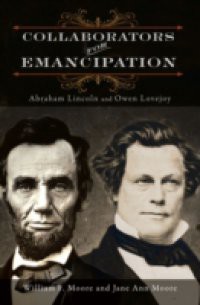Few expected politician Abraham Lincoln and Congregational minister Owen Lovejoy to be friends when they met in 1854. One was a cautious lawyer who deplored abolitionists' flouting of the law, the other an outspoken antislavery activist who captained a stop on the Underground Railroad. Yet the two built a relationship that, in Lincoln's words, "was one of increasing respect and esteem."In Collaborators for Emancipation: Abraham Lincoln and Owen Lovejoy, the authors examine the thorny issue of the pragmatism typically ascribed to Lincoln versus the radicalism of Lovejoy, and the role each played in ending slavery. Exploring the men's politics, personal traits, and religious convictions, the book traces their separate paths in life as well as their frequent interactions. Collaborators for Emancipation shows how Lincoln and Lovejoy influenced one another and analyzes the strategies and systems of belief each brought to the epic controversies of slavery versus abolition and union versus disunion. This multifaceted work of history and biography reveals how Lincoln embraced the radical idea of emancipation, and how Lovejoy shaped his own radicalism to wield the pragmatic political tools needed to reach that ultimate goal.

